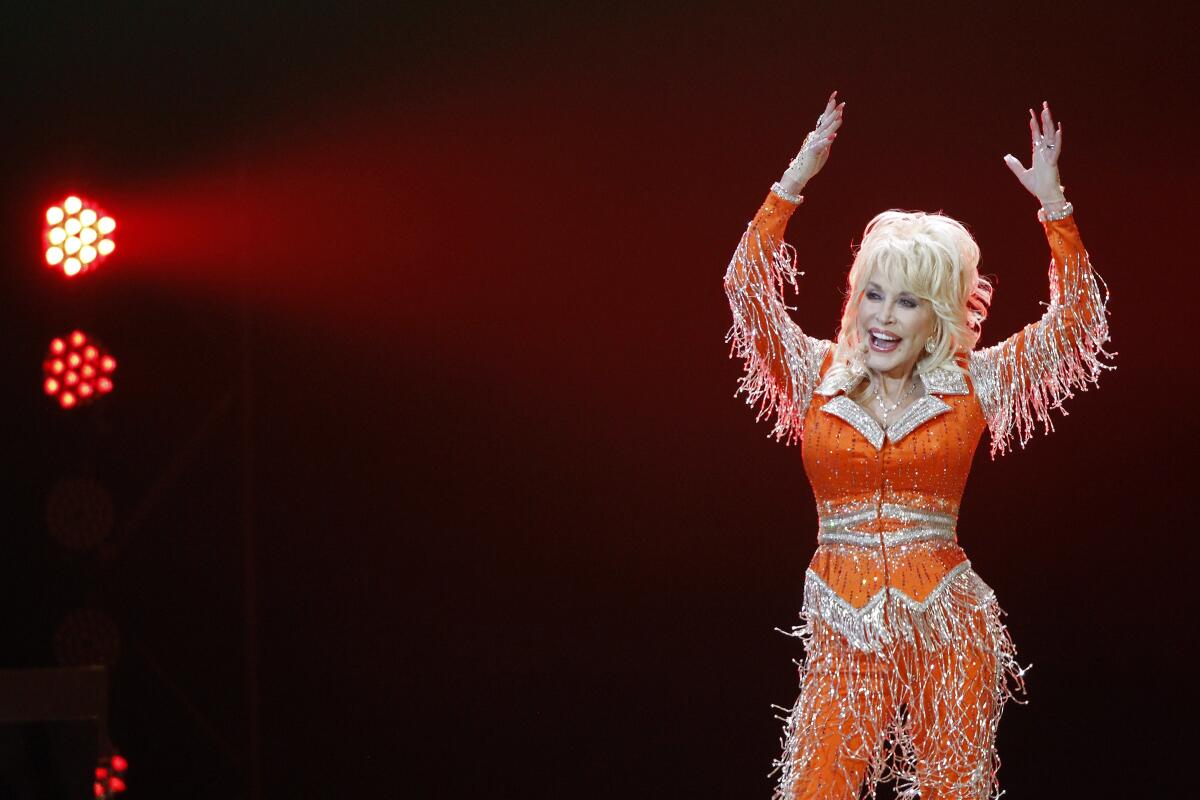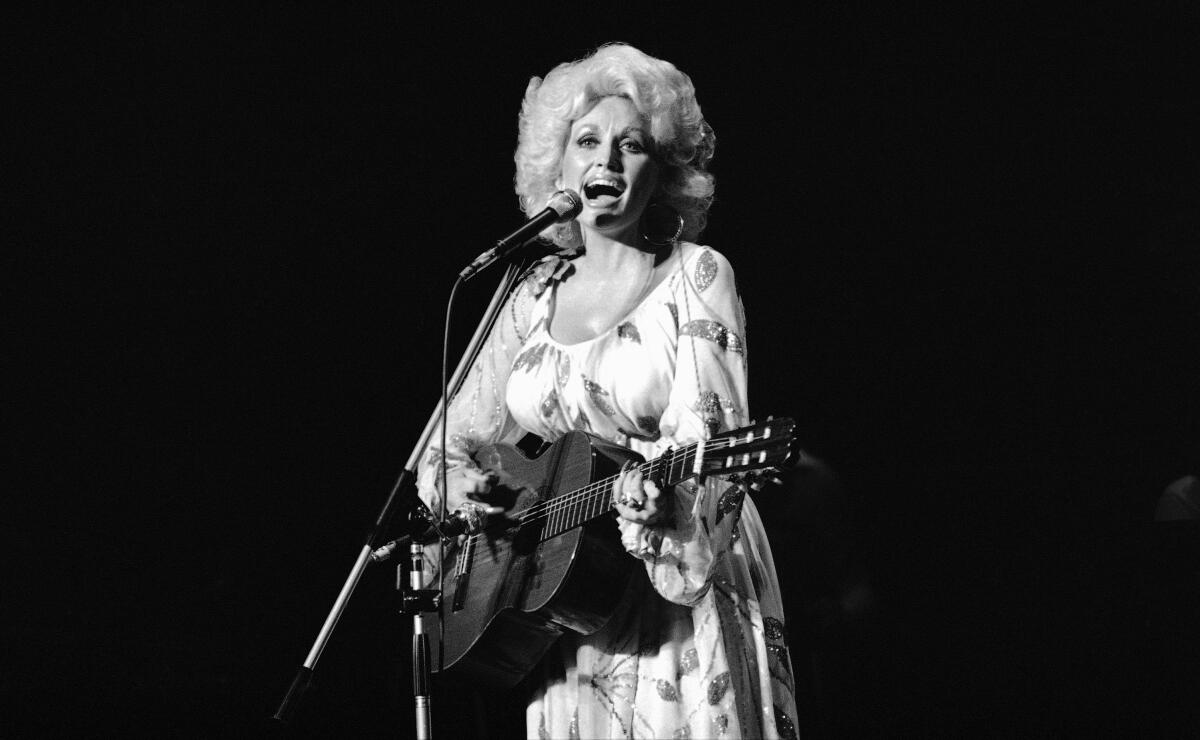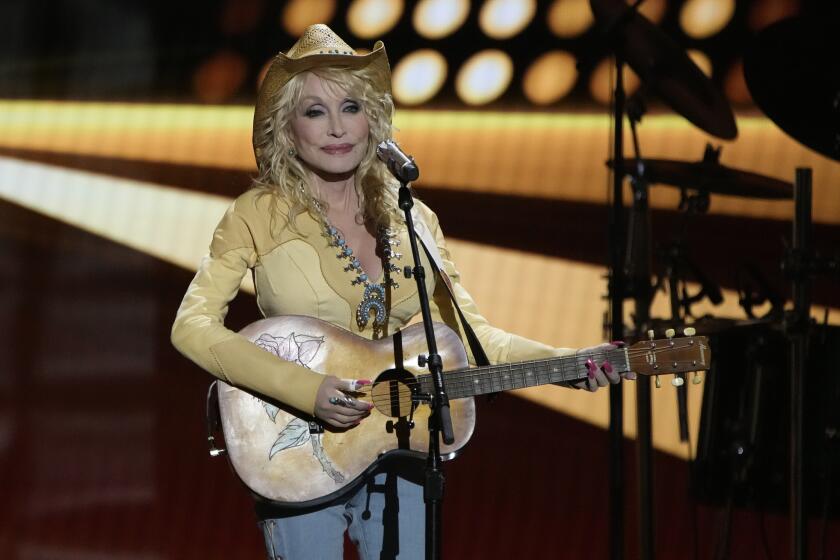Dolly Parton is a total rock star (even if she doesn’t think so)

When the Rock & Roll Hall of Fame announced seventeen new nominees for induction last month, many were surprised to see Dolly Parton on the list, right there alongside rapper Eminem and soul crooner Lionel Richie. The most common responses seemed divided between “Wait, isn’t she a country artist” and “Wait, isn’t she already in?” Otherwise, people were in agreement: Dolly Parton was a lock to be voted into the Hall when inductees are announced in May — and she would deserve it.
That consensus came to us, of course, thanks to her wise and generous songs, and her dulcet voice. It was also thanks to her big-hearted embrace of artifice (“It cost a lot of money to look this cheap,” she likes to say) and to a finely cultivated persona that’s at once down-to-earth and bigger-than-life. And it’s even thanks to her brand of kinder, gentler entrepreneurship (If we can’t make college free for all, can we at least all get jobs at Dollywood?). It’s a cliché, but as close to true as a cliché can ever be: In our polarized times, the one thing everyone agrees on is that Dolly Parton rocks.
Well, not everyone. Turns out one figure who disagreed about putting her into the Rock Hall was Parton herself. In a statement shared yesterday on social media, Parton announced that while she was “extremely flattered and grateful to be nominated,” she didn’t think she had “earned that right.” She didn’t “want votes to be split because of” her, and she was going to “respectfully bow out.”
‘I don’t feel that I have earned that right,’ Dolly Parton says as she withdraws her nomination for this year’s Rock & Roll Hall of Fame induction.
Parton’s announcement was unexpected, to put it mildly, and raised more questions than it answered: Would the Hall honor her wishes and retract her nomination? As ballots have already been completed and returned by some voters, what if Parton wins induction anyway? Would she boycott the ceremony? Of course, the biggest question was: Why?
The reasoning Parton shared for declining her nomination was self-effacing and assertive — and characteristically inscrutable. She exhibited humility even as she emphasized her ambition to be inducted someday “if I am worthy.” Then, in the last part of her demurral, amounting to slightly more than half of her brief statement, she teased a potential new project. This Hall of Fame episode had “inspired [her] to put out a great rock ‘n’ roll album at some point in the future, which [she had] always wanted to do,” the 76-year-old explained.
No disrespect intended to perhaps the greatest singer-songwriter America has ever produced, but none of that makes much sense.

Parton seems to be suggesting that she hasn’t earned induction because she hasn’t yet recorded any rock ‘n’ roll music (that big-tent blend of country, R&B, blues, gospel, soul and more), let alone any rock music (rock ‘n’ roll’s post-Beatles, post-Dylan subgenre, closely identified with the drug culture, the sexual revolution, longer and louder electric guitar solos, plus other signifiers of the 60s). But that stance reveals a far-too-rigid understanding of musical genre. What’s more, it diminishes the interdependent significance, breadth and complexity of both rock and country music — and of Dolly Parton.
Parton grew up in the rural Blue Ridge Mountains, but she turned 10 the year Elvis Presley went nationwide. No surprise then that her first single, cut in 1959, was a spry rockabilly called “Puppy Love.” Over the next several years, her recordings split the difference between Elvis-y ballads and Brill Building-styled “girl group” tunes. By the time Parton was consistently scoring country hits in the early 1970s, such old-time rock ‘n’ roll had grown largely passé on the rock music scene, but its style and sound, and even some of its stars, had migrated to Nashville. Think of Rock Hall of Famer Jerry Lee Lewis’ second career as a country hitmaker.
Or think of Dolly. One of Parton’s early solo hits, for example, was a version of “Muleskinner Blues,” a song by the so-called Father of Country Music, Jimmie Rodgers, himself inducted as an “Early Influence” in the Rock Hall’s inaugural class. Parton gives the hoary tune new life by flipping the gender of Rodgers’ lyric — she’s a “lady muleskinner” — and by goosing it with a hurtling rock-and-soul rhythm track.
In 1974, Parton released what, at this point, is probably her most famous number, “I Will Always Love You,” sung in a style that doesn’t borrow so much from country singers such as Hank Williams, another Early Influence inductee, or Johnny Cash, both a Country Music Hall of Fame and Rock Hall member, as it evokes the tenderly dramatic styles of 1950s rock ‘n’ roll (née rhythm and blues) vocal groups such as Rock & Roll Hall of Fame members the Platters. In case that connection was missed, Parton released “The Great Pretender,” a synth-drenched album of rock ‘n’ roll covers, in 1984.

Parton’s influences through her career have proven nearly as ecumenical as the Rock Hall of Fame’s varied roster. “Dolly wanted to be more like Aretha Franklin …,” her one-time boss and mentor Porter Wagoner once remembered of his former “girl singer’s” pop ambitions and of the artistic tensions that contributed to their split. “She had all [Franklin’s] records, she wanted more punch.” Listen to that coolly rock steady groove on “Jolene,” and you know she found it. Listen to versions of Parton’s songs as performed by Whitney Houston, Linda Ronstadt, the White Stripes, Lil Nas X, Shania Twain and Kacey Musgraves and on and on, and you know Parton has helped others fashion their own genre-bending grooves.
Parton may simply be feeling a sense of loyalty to the community that raised her up — she just co-hosted the Academy of Country Music awards. Of course, she has the right to identify her music however she wishes. And she can change her mind about how she frames her musical story as often as she sees fit — self-invention and even reinvention are integral rock ‘n’ roll values. Remember that at the peak of her career, when she was crossing over from country radio to pop with hits such as “Here You Come Again,” “9 to 5” and “Islands in the Stream,” Parton argued for a more inclusive big-tent approach to genre than she seems to be defending now. “I’m not leaving country music,” she argued then. “I’m taking it with me.”
Here’s hoping Parton will change her mind again and take country music with her to the Rock & Roll Hall of Fame. For Parton, it would be one more recognition of the perpetual interplay among genres and audiences that has made her music so beloved by so many for so long — and of the way her status as a feminist icon and embrace of the LGBTQ community have aligned her with rock’s sense of freedom. For all of us, it would be one more necessary antidote to the toxic, hidebound talk of genre purity that we’re still struggling to move beyond when thinking about popular music. Parton was “genre-fluid,” as it’s now called, before it had a name. But she’s been an arms-wide-open rock star all along.
David Cantwell is the author of “The Running Kind: Listening to Merle Haggard,” to be published in May by University of Texas Press.
More to Read
The biggest entertainment stories
Get our big stories about Hollywood, film, television, music, arts, culture and more right in your inbox as soon as they publish.
You may occasionally receive promotional content from the Los Angeles Times.








